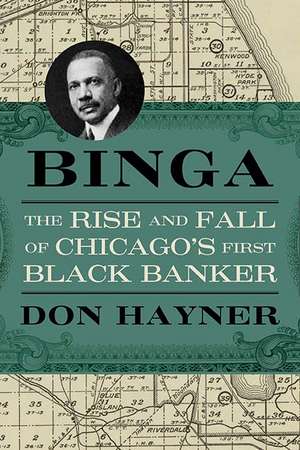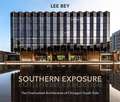Binga: The Rise and Fall of Chicago's First Black Banker: Second to None: Chicago Stories
Autor Don Hayneren Limba Engleză Paperback – 14 noi 2019
Binga is the definitive full-length biography of Jesse Binga, the first black banker in Chicago. Born into a large family in Detroit, Binga arrived in Chicago in 1892 in his late twenties with virtually nothing. Through his wits and resourcefulness, he rose to wealth and influence as a real estate broker, and in 1908 he founded the Binga Bank, the first black-owned bank in the city. But his achievements were followed by an equally notable downfall. Binga recounts this gripping story about race, history, politics, and finance.
The Black Belt, where Binga’s bank was located, was a segregated neighborhood on Chicago’s South Side—a burgeoning city within a city—and its growth can be traced through the arc of Binga’s career. He preached and embodied an American gospel of self-help and accrued wealth while expanding housing options and business opportunities for blacks. Devout Roman Catholics, he and his wife Eudora supported church activities and various cultural and artistic organizations; their annual Christmas party was the Black Belt’s social event of the year. But Binga’s success came at the price of a vicious backlash. After he moved his family into a white neighborhood in 1917, their house was bombed multiple times, his offices were attacked twice, and he became a lightning rod for the worst race riots in Chicago history, which took place in 1919. Binga persevered, but, starting with the stock market crash of October 1929, a string of reversals cost him his bank, his property, and his fortune.
A quintessentially Chicago story, Binga tells the history of racial change in one of the most segregated cities in America and how an extraordinary man stood as a symbol of hope in a community isolated by racial animosity.
The Black Belt, where Binga’s bank was located, was a segregated neighborhood on Chicago’s South Side—a burgeoning city within a city—and its growth can be traced through the arc of Binga’s career. He preached and embodied an American gospel of self-help and accrued wealth while expanding housing options and business opportunities for blacks. Devout Roman Catholics, he and his wife Eudora supported church activities and various cultural and artistic organizations; their annual Christmas party was the Black Belt’s social event of the year. But Binga’s success came at the price of a vicious backlash. After he moved his family into a white neighborhood in 1917, their house was bombed multiple times, his offices were attacked twice, and he became a lightning rod for the worst race riots in Chicago history, which took place in 1919. Binga persevered, but, starting with the stock market crash of October 1929, a string of reversals cost him his bank, his property, and his fortune.
A quintessentially Chicago story, Binga tells the history of racial change in one of the most segregated cities in America and how an extraordinary man stood as a symbol of hope in a community isolated by racial animosity.
Preț: 216.43 lei
Nou
Puncte Express: 325
Preț estimativ în valută:
41.41€ • 43.24$ • 34.20£
41.41€ • 43.24$ • 34.20£
Carte indisponibilă temporar
Doresc să fiu notificat când acest titlu va fi disponibil:
Se trimite...
Preluare comenzi: 021 569.72.76
Specificații
ISBN-13: 9780810140905
ISBN-10: 081014090X
Pagini: 312
Ilustrații: 22 b-w photographs
Dimensiuni: 152 x 229 x 23 mm
Greutate: 0.46 kg
Editura: Northwestern University Press
Colecția Northwestern University Press
Seria Second to None: Chicago Stories
ISBN-10: 081014090X
Pagini: 312
Ilustrații: 22 b-w photographs
Dimensiuni: 152 x 229 x 23 mm
Greutate: 0.46 kg
Editura: Northwestern University Press
Colecția Northwestern University Press
Seria Second to None: Chicago Stories
Notă biografică
DON HAYNER is the retired editor-in-chief of the Chicago Sun-Times. During his tenure as managing editor and editor, the Sun-Times was awarded multiple national and local awards for investigative reporting and breaking news, including the Pulitzer Prize for Local Reporting in 2011. Hayner is the co-author, with Tom McNamee, of Streetwise Chicago: A History of Chicago Street Names, The Metro Chicago Almanac: Fascinating Facts and Offbeat Offerings about the Windy City, and The Stadium: 1929–1994, The Official Commemorative History of the Chicago Stadium. Hayner is a graduate of Ripon College and John Marshall Law School.
Cuprins
Introduction
Chapter 1:“Do you know who that is?”
Chapter 2: Black Sedan
Chapter 3: Painted Signs
Chapter 4:“In the name of the Bingas”
Chapter 5: “Jesse C. Binga”
Chapter 6-:… a man of low and vicious habits”
Chapter 7:--Vernon Avenue
Chapter 8: Dream Book
Chapter 9: -Pink
Chapter 10: State Street
Chapter 11: 5922 South Parkway
Chapter 12: “Barefooted and Bareheaded”
Chapter 13: Distant Thunder
Chapter 14: Riot
Chapter 15: “I will not run”
Chapter 16: Stacking Cash
Chapter 17: Trust and Devotion
Chapter 18: “…they seem like one.”
Chapter 19: 1929
Chapter 20: 1930
Chapter 21: Two White Men in Fedoras
Chapter 22: Blank Pieces of Paper
Chapter 23: “You killed my wife.”
Chapter 24: Waiting and Hoping
Chapter 25: The Giant With A Hundred Eyes
Chapter 26: The Footsteps of God
Chapter 27: “old age and sorrow”
Afterword
Bibliography
Index
Chapter 1:“Do you know who that is?”
Chapter 2: Black Sedan
Chapter 3: Painted Signs
Chapter 4:“In the name of the Bingas”
Chapter 5: “Jesse C. Binga”
Chapter 6-:… a man of low and vicious habits”
Chapter 7:--Vernon Avenue
Chapter 8: Dream Book
Chapter 9: -Pink
Chapter 10: State Street
Chapter 11: 5922 South Parkway
Chapter 12: “Barefooted and Bareheaded”
Chapter 13: Distant Thunder
Chapter 14: Riot
Chapter 15: “I will not run”
Chapter 16: Stacking Cash
Chapter 17: Trust and Devotion
Chapter 18: “…they seem like one.”
Chapter 19: 1929
Chapter 20: 1930
Chapter 21: Two White Men in Fedoras
Chapter 22: Blank Pieces of Paper
Chapter 23: “You killed my wife.”
Chapter 24: Waiting and Hoping
Chapter 25: The Giant With A Hundred Eyes
Chapter 26: The Footsteps of God
Chapter 27: “old age and sorrow”
Afterword
Bibliography
Index
Recenzii
"Hayner’s well-researched, well-balanced Binga highlights not only the life of the banker, but the South Side in which he made—and lost—his fortune. What’s clear from this book is how, for better or worse, Binga was his own man. This is what led [W. E. B.] Du Bois to praise him so highly as 'outspoken . . . self-assertive . . . (a man who) could not be bluffed or frightened . . . (and) did not bend his neck nor kow-tow when he spoke to white men." —The Chicago Tribune
"With Binga, Hayner has done readers and aficionados of Black and Chicago history an excellent service by painting a complete picture of a man who strove to create his own empire. In that light, the book captures how Black enterprise in America was deferred but can be reclaimed—a lesson sorely needed in this time of pandemic and protest." —Christopher A. Smith, Cleveland Review of Books
"There is arguably no better icon of Chicago history that deserves such a dramatic and gripping treatment than Jesse Binga." —Davarian L. Baldwin, author of Chicago's New Negroes: Modernity, the Great Migration, and Black Urban Life
"Don Hayner’s Binga: The Rise and Fall of Chicago’s First Black Banker brings into focus the black belt in its heyday. Hayner’s writing is a vibrant mix of scholarship and storytelling." —L.D. Barnes, Newcity
". . . a book peppered with Hayner's sharp reporter's instincts . . . His book does Binga proud, filling out the portrait of this fascinating and driven man. There will always remain mysteries surrounding him . . . but the Binga who pops from these pages is unforgettable." —Rick Kogan, Chicago Tribune
"Binga is a book that makes clear that, for better and worse, the banker-real estate dealer was his own man." —Patrick T. Reardon, Third Coast Review
“One of the strengths of Hayner’s book is his engaging depiction of how Jesse Binga subsequently evolved from a street peddler into Black Chicago’s most prominent real estate broker and its first banker . . . Hayner’s book-length study provides a long overdue amplification of the life and times of this complex African American entrepreneur.” —Robert E. Weems Jr., the Journal of African American History
"With Binga, Hayner has done readers and aficionados of Black and Chicago history an excellent service by painting a complete picture of a man who strove to create his own empire. In that light, the book captures how Black enterprise in America was deferred but can be reclaimed—a lesson sorely needed in this time of pandemic and protest." —Christopher A. Smith, Cleveland Review of Books
"There is arguably no better icon of Chicago history that deserves such a dramatic and gripping treatment than Jesse Binga." —Davarian L. Baldwin, author of Chicago's New Negroes: Modernity, the Great Migration, and Black Urban Life
"Don Hayner’s Binga: The Rise and Fall of Chicago’s First Black Banker brings into focus the black belt in its heyday. Hayner’s writing is a vibrant mix of scholarship and storytelling." —L.D. Barnes, Newcity
". . . a book peppered with Hayner's sharp reporter's instincts . . . His book does Binga proud, filling out the portrait of this fascinating and driven man. There will always remain mysteries surrounding him . . . but the Binga who pops from these pages is unforgettable." —Rick Kogan, Chicago Tribune
"Binga is a book that makes clear that, for better and worse, the banker-real estate dealer was his own man." —Patrick T. Reardon, Third Coast Review
“One of the strengths of Hayner’s book is his engaging depiction of how Jesse Binga subsequently evolved from a street peddler into Black Chicago’s most prominent real estate broker and its first banker . . . Hayner’s book-length study provides a long overdue amplification of the life and times of this complex African American entrepreneur.” —Robert E. Weems Jr., the Journal of African American History
Descriere
Penned by a former editor in chief of the Chicago Sun-Times, Binga is the definitive biography of the first black banker in Chicago as well as a history of race, politics, and finance in early twentieth-century Chicago.






